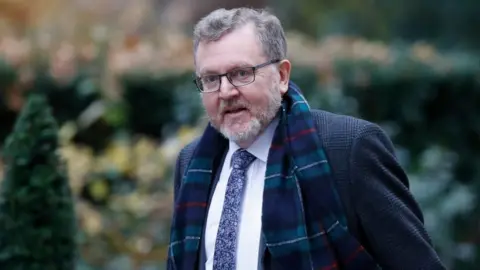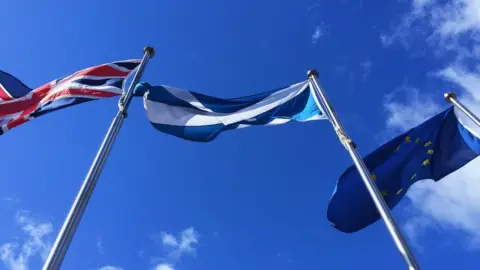David Mundell says Brexit bill 'will be amended'
 Getty Images
Getty ImagesThe UK government will change its Brexit bill to address concerns over its impact on devolution, the Scottish secretary has confirmed.
The bill has been at the centre of a row between the UK and Scottish governments over what happens to powers that return from Brussels after Brexit.
Mr Mundell told the House of Commons that "the bill will be amended".
But he said the move was in response to suggestions from his Tory colleagues, rather than the SNP or Labour.
Clause 11 of the European Union (Withdrawal) Bill says that powers in devolved areas that are currently controlled by Brussels will return to Westminster rather than Edinburgh or Cardiff after Brexit.
The clause was voted through by the Commons this week despite attempts by the SNP and Labour to amend it.
They have warned that the clause represents a "power grab" on devolved responsibilities, despite assurances from the UK government that many of the powers will be transferred from Westminster to the Scottish and Welsh parliaments.
Speaking at Scottish Questions on Wednesday morning, Labour's shadow Scotland secretary Lesley Laird said: "On Monday the Scottish Tories were herded through the lobbies and told to trample all over the devolution settlement.
"So can I ask the Secretary of State who issued those instructions, the prime minister or Ruth Davidson and the secretary of state?"
'Practical amendments'
Mr Mundell responded by saying: "I know she doesn't like it but the bill is going to be amended.
"It's going to be amended not at the behest of the incoherent approach put forward by the Labour opposition or the nationalist approach put forward by the SNP.
"It's going to amended because Scottish Conservatives have come forward with practical amendments to the bill."
The changes are expected to be made at a later stage of the legislative process - potentially when the bill reaches the House of Lords.

What is the row over the Brexit bill about?
 Getty Images
Getty ImagesThe EU Withdrawal Bill states that responsibilities in devolved areas such as agriculture, fishing and the environment that currently reside in Brussels will all return to Westminster rather than Edinburgh or Cardiff immediately after the UK leaves the EU.
The UK government insists this is just a transitional arrangement, and that many of these responsibilities will then be devolved - but has not yet specified which ones.
The Scottish and Welsh governments argue that the powers should automatically go directly to the devolved parliaments under the UK's devolution settlement.
But they agree that frameworks will need to be put in place to ensure co-operation in many areas continues across the UK after Brexit.
They have said they will withhold legislative consent for the bill in their respective parliaments until the dispute over the repatriation of powers from Brussels is resolved.
A series of talks between the two sides - including a recent meeting between Mrs May and Ms Sturgeon - have so far failed to reach an agreement.

The latest talks between the Scottish and UK governments in a bid to break the deadlock over the bill were held last week, but ended without an agreement being reached.
Mr Mundell said at the time that "significant progress" had been made, and that a deal was "close".
He also insisted that the government would be in "listening mode" when amendments to the bill were debated in the Commons, and that "we have never said we wouldn't change the bill to make it better."
But the Scottish government's Brexit secretary, Mike Russell, said that "nothing can be agreed until agreement is reached on both frameworks and amendments to the bill."
That view has previously been echoed by senior Scottish Conservative politicians and the cross-party Scottish affairs committee.
Speaking in Monday's debate on the Brexit bill, Scottish Conservative MP Paul Masterton said his vote with the government "should not and must not be taken as an acceptance of clause 11 as it stands".
He added: "Clause 11 as drafted is not fit for purpose and it must be changed. It doesn't need to be tweaked a little bit, it does need to be amended and replaced with a new version."
A spokesperson for the UK government said: "The Withdrawal Bill delivers certainty for all parts of the UK, including Scotland, as we prepare to leave the EU.
"During the twelve hours of debate on devolution during Committee Stage, we have been carefully considering the input of MPs on all sides of the House.
"We have always said that we will listen to those who offer improvements to the Bill - but we will do nothing that risks undermining the benefits of the UK, such as its internal market."
